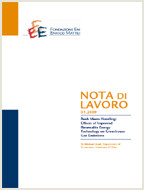Short and Long-term Effects of Environmental Tax Reform

Date
15.01.2013
15.01.2013
Authors
Walid Oueslati
JEL Code
E62, I21, H22, Q28, O41, D62
E62, I21, H22, Q28, O41, D62
Keywords:
Tax reform, Endogenous Growth, Human Capital, Environmental Externality, Transitional Dynamics, Welfare cost
Tax reform, Endogenous Growth, Human Capital, Environmental Externality, Transitional Dynamics, Welfare cost
Publisher
Climate Change and Sustainable Development
Climate Change and Sustainable Development
Editor
Carlo Carraro
Carlo Carraro
This paper examines the macroeconomic effects of an environmental tax reform in a growing economy. A model of endogenous growth based on human capital accumulation is used to numerically simulate the growth effects of different environmental tax reforms and compute their impact on welfare in the short and the long-term. Our results suggest that the magnitude of these effects depends on the type of tax reform. Thus, only environmental tax reform that aims to use the revenue from environmental tax to reduce wage tax and increase the proportion of public spending within GDP, enhances both growth and welfare in the long-term. However, the short-term effect remains negative.
